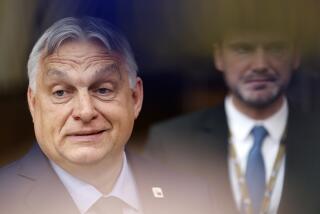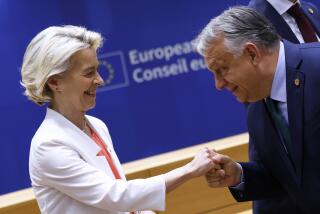Reform Communist Is Hungary’s Front-Runner
BUDAPEST, Hungary — The Communist Party of Hungary and leading opposition groups have reached agreement on a plan for the coming elections that is likely to ensure that the office of president will go to Imre Pozsgay, the Communists’ leading reform politician.
The plan was adopted in the final round-table meeting between the opposition groups and the Communist Party--officially the Socialist Workers Party--and calls for a presidential election Nov. 26, with parliamentary elections to follow within three months.
Leaders of the most powerful opposition group, the Hungarian Democratic Forum, denied Tuesday that they had struck a deal with the Socialist Workers, whose negotiating team was led by Pozsgay and his reform forces.
Bargain Is Suggested
Other opposition figures suggested that the Democratic Forum leaders had made a bargain with Pozsgay to support his plan for an early presidential election in exchange for the post of prime minister in the new government.
The agreement, designed to provide a transition from a one-party state to a multi-party democracy, was signed by the representatives of six of the eight opposition groups and must be approved by Parliament before becoming official. But with the Socialist Workers Party in control of the present Parliament, no major problems are expected.
Pozsgay, who shares a four-man leadership role in the Socialist Workers Party, has been driving steadily and--even his opponents say--shrewdly to win the presidency at a time when the party is split between reformers and conservatives and deeply threatened by the forthcoming elections.
Trounced by Opposition
In recent by-elections, four Communist candidates have been severely trounced by opposition party candidates, suggesting that the Communists are in deeper trouble in Hungary than in Poland, where they were solidly defeated by candidates backed by Solidarity, the independent trade union movement.
Supporters of Pozsgay, one of the best-known politicians in the country and one who has moved out in front of his rivals in advocating reforms, believe he can capitalize on his head start with an early presidential election.
The early election is also expected to help Pozsgay evade a divisive showdown at a Socialist Workers Party congress set for Oct. 6, at which he can present himself as a “national candidate,” above party concerns.
Leaders of the Free Democrats, one of the opposition groups that declined to sign the agreement, charged that the Democratic Forum had sold out to Pozsgay.
‘It Isn’t Necessary’
“It is madness to make a deal this early,” Miklos Herasti, a Free Democratic activist, said. “It isn’t necessary.”
The Hungarian Democratic Forum, with 19,000 dues-paying members and the best national organization among the opposition groups, has won three of four recent by-elections and clearly feels that it can move out ahead of its rivals in the coming election campaign.
Jozsef Antall, the Democratic Forum leader, denied that his party had made a deal with the Communists, despite suggestions to the contrary that have appeared even in the government newspaper Magyar Hirlap.
“What we agreed on was a basis for further discussions,” Antall said. “I think we were responsible to sign the agreement, and those who think we were collaborating with the Communists are wrong.”
Antall and representatives of the other parties to the agreement spent much of the time at a news conference Tuesday emphasizing that they had not entered into a political bargain with Pozsgay. Their repeated insistence reflected what is likely to be a widespread public perception of the agreement.
‘An Orderly Transition’
The opposition groups also emphasized the need for “an orderly transition,” and they suggested that their arrangement with the Communists will ensure this.
“We have an enormous economic crisis in the country,” Imre Boros of the Independent Smallholders Party said, “and there is no way to go on with economic changes without political changes, and political changes demand stability.”
The agreement also set guidelines for proposed reforms of the criminal code and court procedure to “conform to accepted norms of human and political rights.”
It calls for an end to political patronage and influence in the military, and it would bring the so-called “workers’ militia,” which has served as a sort of Communist Party military reserve, under the military’s control.
Decision to Come
It was not certain whether any of the opposition groups were planning to put up candidates in opposition to Pozsgay. Antall said the Democratic Forum will decide whether to do so after consultation with its members.
So far, none of the opposition groups have put forth any potential candidates.
The agreement appears to be an important victory for Pozsgay, but the Socialist Workers Party is not expected to fare well in the parliamentary elections that will follow. Although the early election is expected to help the Communists, most observers believe they will be lucky to win 20% of the seats in the new Parliament.
Political analysts here say that the best the Communists can hope for is a coalition with one of the opposition groups, and some believe that Pozsgay may have prepared the ground for such a coalition in his dealings with the Democratic Forum.
More to Read
Sign up for Essential California
The most important California stories and recommendations in your inbox every morning.
You may occasionally receive promotional content from the Los Angeles Times.










